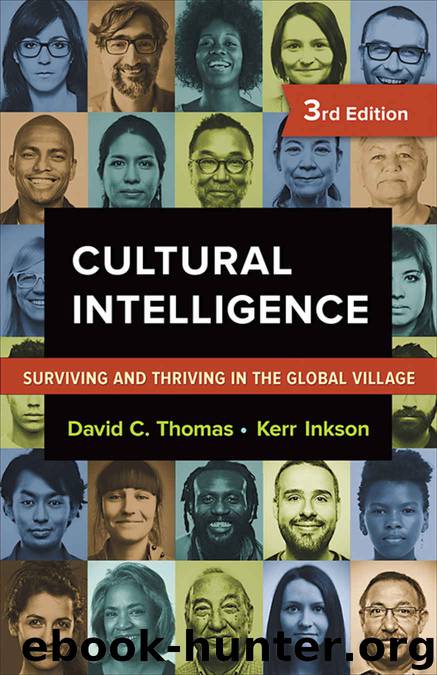Cultural Intelligence: Surviving and Thriving in the Global Village by David C. Thomas & Kerr C. Inkson

Author:David C. Thomas & Kerr C. Inkson [Thomas, David C.]
Language: eng
Format: azw3
Publisher: Berrett-Koehler Publishers
Published: 2017-03-20T04:00:00+00:00
Principles for Cross-Cultural Communication and Negotiation
There is plenty of information available on cross-cultural communication and negotiation, from both everyday observation and systematic research, but spelling out hard-and-fast rules is difficult. However, here are some broad principles.
• Gain the knowledge to anticipate differences. Learn about the codes and conventions of groups you deal with. Be aware of the various areas of difference we have noted in this chapter—for example, verbal versus nonverbal, contextual versus non-contextual, different negotiating styles. Learn the prevailing cultural values of the country—for example, individualist versus collectivist—and think about how these may influence the process. What might be their metaphor for negotiation?
• Practice mindfulness. Pay attention not just to the code and content of messages but also to the context and the conventions of communication. By attending to how messages are delivered you can acquire additional information. Question attributions. In Chapter 3 we discussed how we can go behind the surface behavior of others to attribute motivation and meaning. As we have seen, the meaning we usually attribute is based on a familiar understanding of our own behavior and that of our cultural group. Practicing mindfulness helps us to see new possibilities of meanings in the behavior of other cultural groups.
• Develop cross-cultural skills. How much should you adapt your behavior to accommodate the codes, conventions, and style of another culture? Should you try to imitate them or just be yourself? Some adaptation seems to improve relationships by making the other party more comfortable, but too much adaptation can cause suspicion and distrust. Finding the optimal point of adaptation is an art. By improving your cultural intelligence, you can gain a repertoire of adaptive skills and the knowledge of when they are appropriate.
Download
This site does not store any files on its server. We only index and link to content provided by other sites. Please contact the content providers to delete copyright contents if any and email us, we'll remove relevant links or contents immediately.
Nudge - Improving Decisions about Health, Wealth, and Happiness by Thaler Sunstein(7707)
Deep Work by Cal Newport(7085)
Principles: Life and Work by Ray Dalio(6449)
The Doodle Revolution by Sunni Brown(4764)
Factfulness: Ten Reasons We're Wrong About the World – and Why Things Are Better Than You Think by Hans Rosling(4742)
Eat That Frog! by Brian Tracy(4540)
Thinking in Bets by Annie Duke(4227)
Hyperfocus by Chris Bailey(4119)
Visual Intelligence by Amy E. Herman(3783)
Writing Your Dissertation in Fifteen Minutes a Day by Joan Bolker(3729)
Ogilvy on Advertising by David Ogilvy(3622)
Hidden Persuasion: 33 psychological influence techniques in advertising by Marc Andrews & Matthijs van Leeuwen & Rick van Baaren(3565)
How to Win Friends and Influence People in the Digital Age by Dale Carnegie & Associates(3562)
How to win friends and influence people by Dale Carnegie(3474)
The Pixar Touch by David A. Price(3439)
Schaum's Quick Guide to Writing Great Short Stories by Margaret Lucke(3381)
Deep Work: Rules for Focused Success in a Distracted World by Cal Newport(3237)
Work Clean by Dan Charnas(3123)
The Slow Fix: Solve Problems, Work Smarter, and Live Better In a World Addicted to Speed by Carl Honore(3009)
